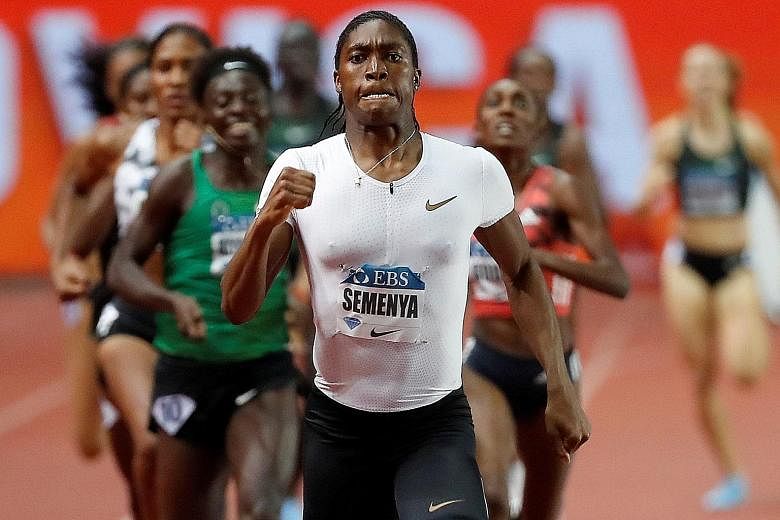LAUSANNE • Double Olympic champion Caster Semenya has vowed to "rise above" difficulties as she considers an appeal after losing her landmark legal case against athletics' governing body International Association of Athletics Federations (IAAF).
It was confirmed yesterday that she will now have to take medication to reduce her testosterone levels if she intends to keep running on the international stage.
The decision, which was announced by the Court of Arbitration for Sport (CAS) after three judges had spent more than two months deliberating over the highly contentious case, came even though CAS agreed that the IAAF's policy was discriminatory to athletes with differences in sexual development (DSDs), like Semenya.
In a statement, CAS said Semenya's team had been unable to prove the IAAF's policy was "invalid".
It added: "The panel found that the DSD Regulations are discriminatory but... such discrimination is a necessary, reasonable and proportionate means of achieving the IAAF's aim of preserving the integrity of female athletics in the Restricted Events."
However, in the 165-page award, the CAS panel also expressed some concerns as to the future practical application of these DSD regulations, leaving open the possibility of future changes should there be indisputable evidence against them.
The CAS ruling may be appealed at the Swiss Federal Tribunal within 30 days.
Following the announcement, the South African reacted with a tweet, stating simply: "Sometimes it's better to react with no reaction."
In a statement released by her lawyers, who are considering contesting the decision, Semenya said: "I know that the IAAF's regulations have always targeted me specifically.
"For a decade, the IAAF has tried to slow me down, but this has actually made me stronger.
"The decision of the CAS will not hold me back. I will once again rise above and continue to inspire young women and athletes in South Africa and around the world."
Semenya, 28, had taken the IAAF to court over its plans requiring female athletes with DSDs - who are often born with male testes - to take hormone suppressants, arguing the policy was discriminatory, unfair, and potentially posed a health risk.
However, during the five-day hearing last month, the IAAF maintained that its policy was solely about creating a level-playing field for all women.
Central to its case was that over 99 per cent of females have around 0.12-1.79 nmol/L of testosterone in their bodies - while DSDs like Semenya are in the male range of 7.7-29.4 nmol/L.
The IAAF's argument was that because testosterone confers significant advantages in size, strength and power, it was fair to require DSD athletes to reduce their testosterone to below 5 nmol/L for at least six months if they wanted to compete internationally at distances ranging from 400m to a mile.
That policy will now be enacted with immediate effect.
The verdict is certain to cause controversy as Semenya was backed by a global coalition of nations and scientific experts who argued testosterone is an arbitrary and unfair measure for determining gender.
In a rare intrusion into sport, the United Nations Human Rights Council adopted a resolution last month branding the IAAF rules "unnecessary, humiliating and harmful".
Semenya's testosterone levels are not publicly known, but she is unlikely to be the only athlete affected.
The two athletes who finished behind her in the Rio Olympics 800m, Francine Niyonsaba of Burundi and Kenya's Margaret Wambui, have also faced questions about their testosterone levels.
Semenya took steps to reinvent her career last week when she won the 5,000m at the South African Athletics Championships, an event that would allow her to compete outside of the IAAF regulations.
THE GUARDIAN, AGENCE FRANCE-PRESSE, REUTERS

